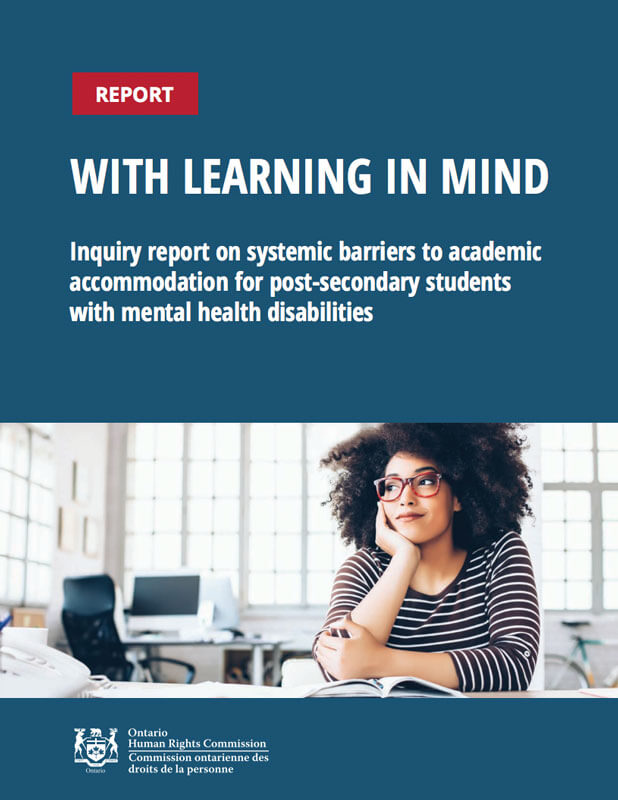With Learning In Mind: Inquiry report on systemic barriers to academic accommodation for post-secondary students with mental health disabilities
In 2016, the Ontario Human Rights Commission (OHRC) wrote to public colleges and universities in Ontario asking them to implement six specific measures to reduce systemic barriers to post-secondary education for students with mental health disabilities. Released on June 9, 2017, the Inquiry Report describes the systemic barriers identified by the OHRC, the modifications to post-secondary institutions’ policies and procedures requested by the OHRC, and the institutions’ self-reported progress in implementing the requested changes.
The Six Measures
- Eliminate mandatory disclosure of diagnosis
- Provide interim accommodations
- Accommodate temporary mental health disabilities
- Consider retroactive accommodations where appropriate
- Arrange for accommodation through centralized process
- Implement clear communications and training
Reported Outcomes
Based on self-reported modification of policies, guidelines and procedures, post-secondary institutions have made substantial progress in addressing the barriers experienced by students with mental health disabilities in accessing academic accommodations. Some institutions described innovative ways to implement the six measures. These included using software to arrange and communicate accommodations directly with instructors using the student’s ID number as an identifier, and setting out clear and practical guidelines on source of information used to determine interim accommodations. These sources included student self-reports, history of formally identified disability, third-party reports, personal observations by the disability service professionals, screening tools, history of academic accommodations, relevant documentation from previous educational institutions and proof of disability from non-medical sources.
Many institutions highlighted their proactive initiatives to maximize accessibility and remove barriers for students with mental health disabilities.
Examples are:
- Anxiety management support groups
- Student mental health and well-being strategies that include early intervention for students in distress
- A partnership with the Canadian Mental Health Association to develop a student training program to support mental health on campus
- Developing an innovative, award-winning Mental Health Hub service delivery model that has sufficiently improved students’ access to supports on and off campus
- Mandatory training initiatives for faculty and staff such as suicide prevention/awareness, Mental Health First Aid, Assisting Students in Distress.
Remaining Concerns
In response to the OHRC’s inquiry, several institutions reported policies or practices that raise concerns.
- Requiring interim documentation
- Accepting documentation only from specialists and treating family physicians
- Emphasis on “self-advocacy”


